Fulfillment: Difference between revisions
Iamzeroone (talk | contribs) (Filled out all fulfillment categories with game descriptions. Sometimes elaborated. Included screenshots.) |
Iamzeroone (talk | contribs) m (Jake confirmed the removal of the term "race" from the game. Changed instances of "race/races" to "species" and updated links.) |
||
| (2 intermediate revisions by the same user not shown) | |||
| Line 1: | Line 1: | ||
[[File:Citizen gui.png|thumb|427x427px|The Citizen GUI showing the main categories of fulfillment.|alt=Screenshot of The Citizen GUI showing the main categories of fulfillment.]] | [[File:Citizen gui.png|thumb|427x427px|The Citizen GUI showing the main categories of fulfillment.|alt=Screenshot of The Citizen GUI showing the main categories of fulfillment.]] | ||
'''Fulfillment''' is the measure of needs and wants being met for [[subjects]] in a [[settlement]]. The player must make sure their settlement satisfies as many needs and wants as possible. All of the [[ | '''Fulfillment''' is the measure of needs and wants being met for [[subjects]] in a [[settlement]]. The player must make sure their settlement satisfies as many needs and wants as possible. All of the [[species]] have different preferences and the player must cater to all of them. | ||
Fulfillment has a major impact on [[citizen]] happiness. When a | Fulfillment has a major impact on [[citizen]] happiness. When a species' happiness is greater than 80%, immigration can occur and at greater rates as happiness nears 100%. When happiness is low, citizens may choose to leave the settlement. Happiness influences citizen loyalty. When a species' loyalty is below 100%, there is a chance that a [[riot]] can occur, with the chance increasing as loyalty declines and becomes further from 100%. When riots occur, other species can join in. | ||
[[Slaves]] also have fulfillment stats and these impact how submissive they are. As submission decreases from 100% the chance that a slave uprising can occur increases. | [[Slaves]] also have fulfillment stats and these impact how submissive they are. As submission decreases from 100% the chance that a slave uprising can occur increases. | ||
| Line 56: | Line 56: | ||
===Environment=== | ===Environment=== | ||
The Environment GUI is simply a long list of statuses for various wants/needs broken into several sub-categories. | The Environment GUI is simply a long list of statuses for various wants/needs broken into several sub-categories. | ||
====Environment==== | ====Environment==== | ||
*'''Roads''' - The quality and access to roads the subject has. Try building roads in the busy parts of the city, and of higher quality, to increase this. | *'''Roads''' - The quality and access to roads the subject has. Try building roads in the busy parts of the city, and of higher quality, to increase this. | ||
*'''[[Building|Building Preference]]''' - Building preference. Different | *'''[[Building|Building Preference]]''' - Building preference. Different species like to hang around in different kind of structures. Some like wood, some like mountain caves. This value is registered when the subject is within a structure. | ||
*'''Climate -''' Climate is static once you've selected a starting location and can't be improved. | *'''Climate -''' Climate is static once you've selected a starting location and can't be improved. | ||
* '''Others -''' The feeling towards your city's composition of species. A species may like or dislike another species. | * '''Others -''' The feeling towards your city's composition of species. A species may like or dislike another species. | ||
| Line 108: | Line 108: | ||
===Religion=== | ===Religion=== | ||
[[File:ReligionGUI.png|alt=A screenshot of the Religion GUI|left|thumb|250x250px|Religion GUI]] | [[File:ReligionGUI.png|alt=A screenshot of the Religion GUI|left|thumb|250x250px|Religion GUI]] | ||
The Religion GUI shows a graph detailing the total increase or decrease in religious followers each day, as well as a breakdown of the total followers for each religion. Religions can be approved or denied for worship by checking or unchecking their associated checkbox. Religions can provide various bonuses, such as improved farming or the production of certain goods. Additionally, access can be granted/denied to graveyards and crypts. | The Religion GUI shows a graph detailing the total increase or decrease in religious followers each day, as well as a breakdown of the total followers for each religion/[[Gods|god]]. Religions can be approved or denied for worship by checking or unchecking their associated checkbox. Religions can provide various bonuses, such as improved farming or the production of certain goods. Additionally, access can be granted/denied to graveyards and crypts. | ||
*'''Faith''' - Faith is gained by having access to quality temples of the subject's religion. Low faith can lead to conversion to other religions. | *'''Faith''' - Faith is gained by having access to quality temples of the subject's religion. Low faith can lead to conversion to other religions. | ||
| Line 144: | Line 144: | ||
====Law==== | ====Law==== | ||
*'''Equality''' - Same fair treatment of all | *'''Equality''' - Same fair treatment of all species. | ||
*'''Crime -''' The amount of crimes in the city. | *'''Crime -''' The amount of crimes in the city. | ||
Latest revision as of 06:55, 16 September 2023
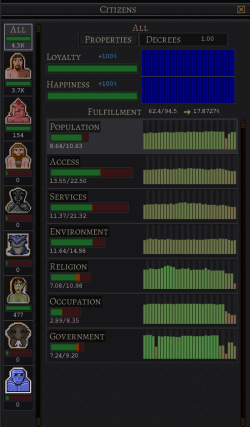
Fulfillment is the measure of needs and wants being met for subjects in a settlement. The player must make sure their settlement satisfies as many needs and wants as possible. All of the species have different preferences and the player must cater to all of them.
Fulfillment has a major impact on citizen happiness. When a species' happiness is greater than 80%, immigration can occur and at greater rates as happiness nears 100%. When happiness is low, citizens may choose to leave the settlement. Happiness influences citizen loyalty. When a species' loyalty is below 100%, there is a chance that a riot can occur, with the chance increasing as loyalty declines and becomes further from 100%. When riots occur, other species can join in.
Slaves also have fulfillment stats and these impact how submissive they are. As submission decreases from 100% the chance that a slave uprising can occur increases.
In most cases, focusing on satisfying fulfillment will result in the player not needing to worry about citizen loyalty and happiness or slave submission.
Categories
There are seven categories of fulfillment and most offer not only information about existing needs, but also configurable controls that can impact those needs, such as granting access to more food, denying access to a specific service, or even deciding what religion people may practice. All of this information can be viewed and controls can be set for everyone at once or a specific species. The below will be explained as if viewing only one particular species. For the particular species being viewed, only the fulfillment items with a green/red bar to the right are actually cared about by that species.
Population
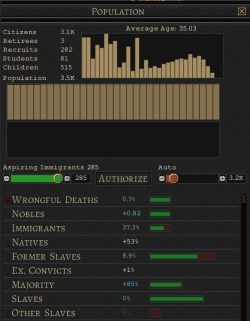
The Population GUI shows settlement population, the average age of the population, the population broken down by age ranges, detailed increases/decreases to the population per day, the amount of immigrants that would like to be let in, a slider and button to authorize a specific amount of immigrants their entry, a slider to automatically authorize immigrants up to a certain total population, and, finally, fulfillment information related to the population.
- Population - The amount of citizens living in your city. This does not include children, as they are not considered citizens yet.
- Wrongful Deaths - The amount of people who have wrongfull died. This memory lingers in the minds of people after the events, but will slowly be forgotten.
- Nobles - The amount of nobles of this species.
- Immigrant - An immigrant is someone that has immigrated to your city and not born in it. Native citizens can have a problem with these.
- Natives - Citizens that have been born and bred in the settlement.
- Former Slaves - Citizens that are former slaves.
- Ex. Convicts - People on parole from a prison.
- Majority - The percentage of this species contra your total population.
- Slaves - The amount of enslaved of the same species.
- Other Slaves - The amount of enslaved of all the species.
Access
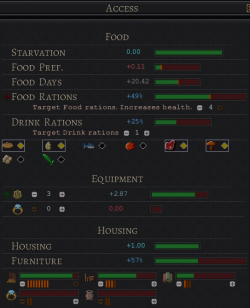
The Access GUI shows the current access to food, equipment, housing, and furnishings for housing. There are controls to set the quantity of food and drink rations that are available to citizens, as well as what foods they are allowed to eat. Foods inside a white square indicate food that a species prefers. The amount of equipment can be adjusted, as well as the furnishings citizens are allowed to have in their homes.
Food
- Starvation - If a subject can't find food when hungry, it will eventually start to starve. Starving subjects will refuse to work, instead they will spend all their remaining effort to find something to eat.
- Food Pref. - Food Preference. Each species has its own preference in food in the form of a list of edible resources. Each time a subject eats, it craves a specific food resource, selected randomly from the list. If the subject is successful in finding it, food preference will go up. If not, it will go down. This mechanic only works when the subject visits a food service room and not when eating from the ground, or in a warehouse.
- Food Days - How long the food in your stockpiles, eateries and canteens will last.
- Food Rations - How many pieces of food each subject is allowed when they eat. Rations more than 1 can only be extracted from an eating service. Increases health.
- Drink Rations - How many drinks subjects are allowed when thirsty. High rations will lead to more drunkenness and decrease health.
Equipment
Having your subjects equip certain items can boost them in different ways. It can also improve happiness amongst them.
Housing
- Housing - The housing of your citizens.
- Furniture - If allowed, subjects can use resources to furnish their dwellings. The resources used as furniture are consumed each year.
Services
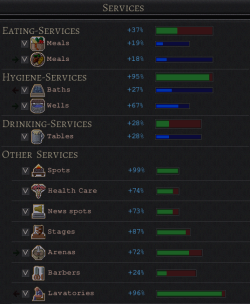
All of the services listed in the Services GUI can be enabled or disabled via the check box next to them, effectively approving or denying access to a particular species.
- Eating Services - The quality and accessibility of eateries and canteens.
- Hygiene Services - The quality and accessibility of bathhouses and wells.
- Drinking Services - The quality and accessibility of taverns.
- Other Services - The quality and accessibility of hearths, health care, news spots, stages, arenas, barbers, and lavatories.
Environment
The Environment GUI is simply a long list of statuses for various wants/needs broken into several sub-categories.
Environment
- Roads - The quality and access to roads the subject has. Try building roads in the busy parts of the city, and of higher quality, to increase this.
- Building Preference - Building preference. Different species like to hang around in different kind of structures. Some like wood, some like mountain caves. This value is registered when the subject is within a structure.
- Climate - Climate is static once you've selected a starting location and can't be improved.
- Others - The feeling towards your city's composition of species. A species may like or dislike another species.
- Squareness - How squarely shaped your rooms are.
- Roundness - How round and/or organically shaped your rooms are.
- Cannibalism - Cannibalism is eating other humanoids. It can be done by constructing cannibal rooms. Starving subjects can also resort to cannibalism. Cannibalism is a singular event, and once it happens once, it will take a long while to diminish.
- Corpses - Unburied corpses can upset your citizens. They can also spread disease.
Access
- Noise - Noise travels from noisy rooms out into the open and disturbs your subjects. It's hindered slightly by walls. Placing double walls will eliminate noise entirely.
- Lighting - Most people like to have the darkness lit by light at night. Rooms do not count towards this value.
- Space - Open space values.
- Sweet Water - Proximity to sweet water. Some species are naturally drawn to water. The proximity increases output of farms and orchards. Sweet water can be accessed from non-ocean water sources and wells.
- Salt Water - Proximity to salt water. Some species might be drawn to salt water.
- Awe - Awe affects most people positively, and enforces their obedience to you. Improved by having statues and/or pillars and having the subject be within their radius of influence, or by certain roads.
- Dread - Dread increases people's obedience, but can make them unhappy. Improved by certain roads (namely, dire roads).
- Harmony - Some people like harmony and nature. Certain buildings emit harmony, such as trees. It is also improved by certain roads.
Monuments
- How many of this kind of of monumanet there are divided by your total population
- Humidifier
- Flowerbeds
- Pillars
- Statues
- Trees
Battle
- Recruits - The amount of subjects undergoing training and are not yet fit for a division.
- Soldiers - The amount of soldiers.
- Soldier Experience - The level of soldier experience of the subjects. Experience is gained through fighting and killing enemy troops.
- Melee Training - The level of training of this subject. If a subject is assigned to a division, he will visit a training ground and train until he reaches the minimum training level of that division.
- Ranged Training - Improves a soldier's capabilities of flinging ranged projectiles. A soldier must have basic training before they can do range training.
- Enemy Kills - The amount of enemy soldiers killed.
- Routing - The amount of subjects that are routing.
Storage
- How much of each resource is stored
Religion
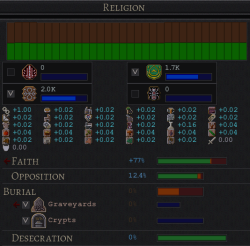
The Religion GUI shows a graph detailing the total increase or decrease in religious followers each day, as well as a breakdown of the total followers for each religion/god. Religions can be approved or denied for worship by checking or unchecking their associated checkbox. Religions can provide various bonuses, such as improved farming or the production of certain goods. Additionally, access can be granted/denied to graveyards and crypts.
- Faith - Faith is gained by having access to quality temples of the subject's religion. Low faith can lead to conversion to other religions.
- Opposition - Different religions like other religions differently. Some just don't mix, and can cause unrest.
- Burial - Access to graveyards and/or crypts.
- Desecration - Caused ether by you deleting a place of burial, or one becoming damaged. A graveyard must be deactivated for a while before it can be removed, all the burial spots must be empty.
Occupation
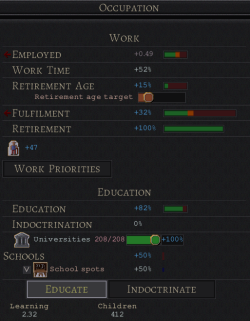
The Occupation GUI offers control of citizen retirement age, the Work Priorities GUI, a slider for setting the desired citizen education level, as well as the option to educate or indoctrinate this species.
Work
- Employed - The amount of subjects currently employed.
- Work Time - Progress of current work shift. Subject try to work for the better part of the day. Will reset when shift has ended.
- Retirement Age - When a subject has worked half of its life expectancy, it can retire. A decree of 0% will have your subjects work their whole lives. 100% and subjects will retire once half their average life-span has been reached. The player can change the retirement age target.
- Fulfillment - How this subject feels about its current work situation. Different species like different workplaces. You can set the order of how your workplaces should be filled in the species tab.
- Retirement - Retirement activities. If retired, then current situation. If not, the prospect. Increased by retirement rooms and retirement age. Retirees will look for an activity that makes them the most happy.
Education
- Education - The education level of your citizens. Increased by having them go to school when young, and Universities when adult. Increases productivity of some industries benefiting from critical thinking.
- Indoctrination - Instead of learning useful things, education facilities can instead teach patriotism and do some harmless brainwashing. Indoctrinated subjects will be much more submissive.
Government
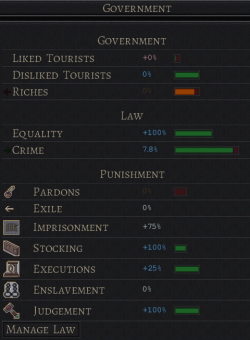
The Government GUI is primary just a list of government and law related fulfillment stats. Additionally, a button is included to access the Law GUI, which is also accessible by clicking the last icon in the top row of the overview panel at the top left of the screen.
Government
- Liked Tourists - Amount of tourists that are liked by the species.
- Disliked Tourists - Amount of tourists that are disliked by the species.
- Riches - How much riches are in your coffers divided by your citizens and nobles.
Law
- Equality - Same fair treatment of all species.
- Crime - The amount of crimes in the city.
Punishment
- Pardons - Criminals that are pardoned.
- Exile - Punishment by exile.
- Imprisonment - Punishment by imprisonment.
- Stocking - Punishments in the stock.
- Executions - Punishment by execution.
- Enslavement - Punishment by enslavement.
- Judgement - Criminals processed in courts.